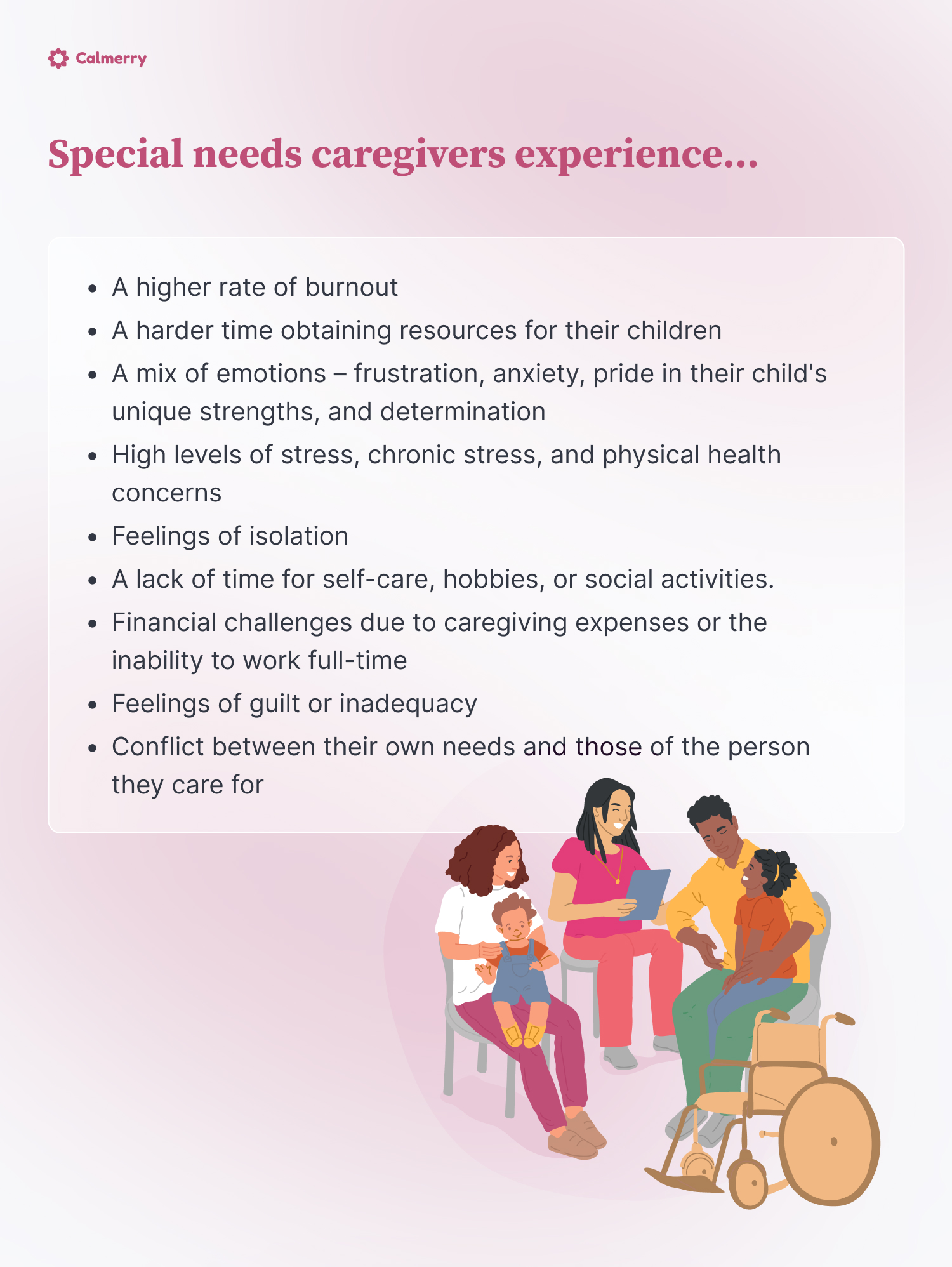Life as a Special Needs Caregiver and Parent: Strategies for Managing Burnout

In this article
Being a special needs caregiver, especially as a parent of a child with autism, ADHD, or a chronic illness, comes with its own set of obstacles.
The responsibilities can be overwhelming, and the emotional toll is immense. The day-to-day routine of caring for a child with special needs can be exhausting. It leaves very little time for self-care and can easily lead to burnout if not managed.
In this article, we will explore the various facets of managing burnout as a special needs caregiver, offering practical strategies and resources to support caregivers.
The unique challenges of special needs parenting
Special needs parenting involves navigating a unique set of challenges – both physical and emotional. From therapy appointments to advocating for your child’s needs to balancing time for yourself – it can be overwhelming.
Research shows that special needs parents experience a higher rate of burnout and a harder time obtaining resources for their children than other parents. [1] Roskam, I., & Mikolajczak, M. (2023). Parental burnout in the context of special needs, adoption, and single parenthood. Children (Basel), 10(7), 1131. https://doi.org/10.3390/children10071131 There are financial and social challenges as well.
Understanding the specific challenges you face is the first step in managing burnout and getting the support you need.

The emotional landscape of special needs caregiving
Burnout
The emotional rollercoaster that special needs parents experience can almost certainly lead to burnout if not managed. Acknowledging and addressing these emotions is crucial for maintaining mental well-being.
Emotional ups and downs
As humans, we all experience a wide range of emotions. Special needs parents often grapple with a mix of emotions – frustration, anxiety, pride in their child’s unique strengths, and determination to provide the best possible life for their child.
Emotional ups and downs can be difficult, and often, there may be a feeling that no one understands. Regulating these difficult emotions is important to maintain positive mental health.
High level of stress
As a special needs parent or caregiver, you carry a heavy load of responsibilities, often 24/7, without adequate breaks or support. This can lead to high levels of stress.
High levels of stress have been linked to physical health concerns. A research study outlined the potential health risks faced by parents of children with autism or ADHD due to chronic stress. [2] Lovell, B., Moss, M., & Wetherell, M. (2012). The psychosocial, endocrine and immune consequences of caring for a child with autism or ADHD. Psychoneuroendocrinology, 37(4), 534–542. https://doi.org/10.1016/j.psyneuen.2011.08.003
This study concluded that these parents had elevated levels of cortisol, a hormone produced in response to stress, as well as CRP, an indicator associated with various serious illnesses such as cancer, diabetes, and heart disease.
Feelings of isolation
The constant advocacy for a child’s needs, coupled with society not fully understanding the challenges of raising a child with special needs, can lead to feelings of isolation.
Parents may also feel judged or stigmatized, which can lead to further feelings of sadness or frustration.
– Dr. Bibi Shah, PhD., LMHC
Lack of time for yourself
Caregivers also struggle with a lack of time for self-care, hobbies, or social activities. They may face financial challenges due to caregiving expenses or the inability to work full-time or working and balancing caregiving duties.
Feelings of guilt
Caregivers may also be dealing with feelings of guilt or inadequacy and conflict between their own needs and those of the person they care for.
They may feel guilty about taking some out for themselves and their needs.
Recognizing burnout in special needs parenting
What is burnout? Burnout is a state of emotional, physical, and mental exhaustion caused by excessive and prolonged stress.
Parental burnout can occur for all parents, but for special needs caregivers, burnout can become a frequent occurrence due to the constant demands of caring for a child with a developmental disability. [3] Abramson, A. (n.d.). The impact of parental burnout. https://www.apa.org. https://www.apa.org/cover-parental-burnout
– Dr. Bibi Shah, PhD., LMHC
Identifying the signs of caregiver burnout is essential. From physical fatigue to emotional exhaustion, recognizing the symptoms early allows for proactive measures.
Here are some symptoms of burnout to watch out for:
- Feeling fatigued, overwhelmed, or hopeless.
- Frequent feelings of sadness, anxiety, or depression
- Difficulty sleeping.
- A decrease in social interactions or feeling detached from others.
- Lack of interest in activities that were once enjoyable, such as hobbies or spending time with loved ones.
- Forgetfulness and difficulty concentrating on tasks
- Physical symptoms such as headaches, stomachaches, or chest pain
- Irritability or sudden outbursts of anger
If you feel some or all of the above, consider implementing the strategies outlined below.
Coping with special needs caregiver burnout: self-care and resilience building
1. Self-care for special needs caregivers
Prioritizing self-care is not selfish; it is a necessity. Practical self-care that works for you can make a significant difference in preventing burnout.
Take breaks – even if it is just for a few minutes. Make time for things you enjoy and practice mindfulness or deep breathing techniques. [4] Staff, M. (2023, January 6). Getting Started with Mindfulness. Mindful. https://www.mindful.org/indfulness-getting-started/
A little self-care on a daily basis can go a long way to your overall well-being.
2. Building a support system
Special needs parenting can be isolating. Establishing a strong support system, both within and outside the special needs community, provides a crucial lifeline for caregivers.
It allows space to talk and connect with others who are going through similar challenges. When we can share with others about what we are going through, it makes us feel supported and heard.
– Dr. Bibi Shah, PhD., LMHC
Many communities offer support groups for parents and caregivers that can help.
3. Setting realistic expectations
Learning to set realistic expectations for yourself and your child is important. Understanding and accepting your limitations can help alleviate the pressure that leads to burnout.
As parents, we may feel the need to do it all for our child, and this can lead to feeling overwhelmed. It is also important to understand your child’s limitations as well. For example, children with autism or ADHD may have trouble with routines or impulsivity due to deficits in executive functioning. Understanding this can make it easier to see things from your child’s perspective.
4. Ask for help
Being a special needs mom or dad can be hard. But asking for help shouldn’t be. Asking a trusted friend or family member to help you can provide much-needed breaks for caregivers.
Whether through family, friends, or professional services, respite care is a valuable resource. It can give you the much-needed time to rest and recharge.
Parenting strategies for specific needs
1. Parenting a child with autism
Autism comes with its own set of unique challenges. Understanding and addressing these challenges can help parents of children with autism manage burnout more effectively.
Children with autism need specialized services and therapy that parents need to coordinate, schedule, and get transport to. It can also involve advocating for your child for education and resources.
Many children with autism have sensory and behavioral challenges. Parents need to navigate environments that may be overwhelming for their child, making everyday activities like grocery shopping or attending events more challenging.
2. ADHD parenting
Parenting a child with ADHD requires patience and understanding, as well as consistent structure. Creating and maintaining routines can help manage symptoms and reduce stress for both the child and the caregiver.
It also requires a parent to be aware of their child’s limitations and challenges. A child with ADHD may have specific challenges in executive functioning, such as impulsivity and hyperactivity, that they will need support for.
3. Caring for a child with a chronic illness
A chronic illness can be overwhelming for both the child and caregiver. It’s important to prioritize self-care and establish a strong support system.
It’s also essential to educate yourself about your child’s condition and to advocate for their needs.
– Dr. Bibi Shah, PhD., LMHC
Stay organized with medication schedules, appointments, and treatment plans to reduce stress and manage burnout.
Seeking professional help for burnout as a caregiver
If you’ve tried implementing the strategies for burnout mentioned here but are still struggling, it might be wise to consider reaching out for professional help. A professional can help you understand your situation and provide support.
Therapy and counseling services can be beneficial and provide a safe space to explore your emotions and develop coping mechanisms.
Online therapy is also available to provide support.
Joining a support group and connecting with other special needs parents can be incredibly empowering. Joining support groups provides a platform to share experiences, gain insights, and foster a sense of community.
Conclusion
Being a special needs caregiver is a journey filled with ups and downs. Managing burnout is not a one-size-fits-all endeavor, but with a combination of self-care, support, and tailored strategies, special needs moms and dads can navigate the storm and find renewed strength to continue providing the best care for their children.
Remember, you are not alone, and seeking help is a sign of strength, not weakness.
A word from Calmerry
At Calmerry, we recognize the extraordinary dedication and challenges faced by special needs caregivers and parents.
If you’re feeling the weight of burnout or need support navigating these unique challenges, our compassionate team of mental health professionals is here for you.
We offer tailored support to help you find balance, access resources, and take meaningful steps towards self-care. You’re not alone in this journey, and accessible help at your convenient place and time is available.
Roskam, I., & Mikolajczak, M. (2023). Parental burnout in the context of special needs, adoption, and single parenthood. Children (Basel), 10(7), 1131. https://doi.org/10.3390/children10071131
Lovell, B., Moss, M., & Wetherell, M. (2012). The psychosocial, endocrine and immune consequences of caring for a child with autism or ADHD. Psychoneuroendocrinology, 37(4), 534–542. https://doi.org/10.1016/j.psyneuen.2011.08.003
Abramson, A. (n.d.). The impact of parental burnout. https://www.apa.org. https://www.apa.org/cover-parental-burnout
Staff, M. (2023, January 6). Getting Started with Mindfulness. Mindful. https://www.mindful.org/indfulness-getting-started/
online therapy
live video session




